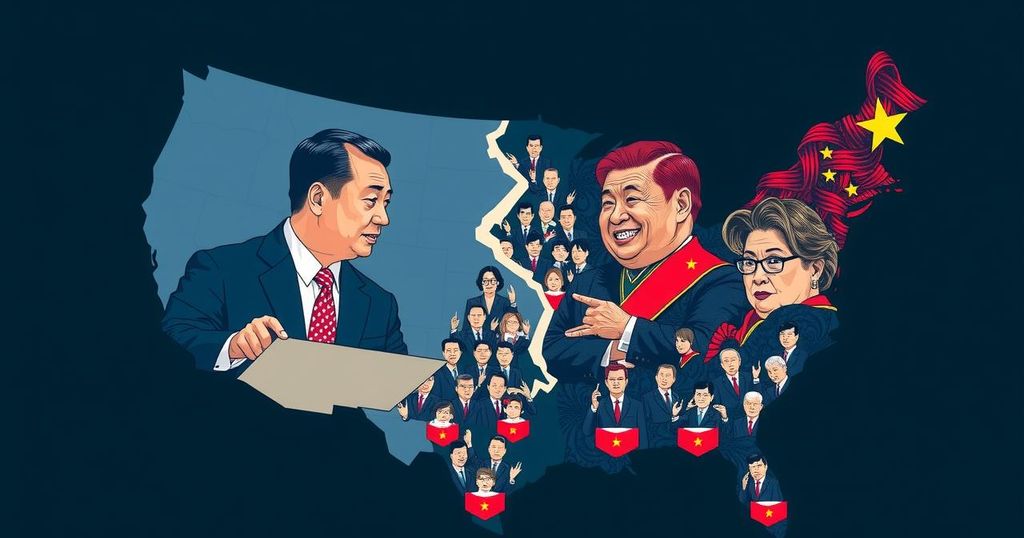World news
AMERICA, ASIA, BEIJING, BEIJING DAILY, CAPITOL HILL, CCTV, CHINA, CNN, DC, ELECTION, FOREIGN POLICY, GLOBAL TIMES, LI SHUO, MEDIA COVERAGE, MEXICO, NATIONAL SECURITY, NORTH AMERICA, NORTHERN MARIANA ISLANDS, OCEANIA, UNITED STATES, US, US-CHINA RELATIONS, WASHINGTON, WASHINGTON, DC, WEIBO, WHITE HOUSE, XI JINPING
Stella Nguyen
0 Comments
Chinese Media Highlights US Political Polarization Amid Election Results
As the U.S. elections draw near, Chinese state media emphasizes political divisions and unrest in America, viewing the election as a potential catalyst for turmoil. The coverage reflects a conviction that U.S.-China relations will not improve regardless of the election result, showcasing a critique of American democracy. Both historical and contemporary tensions influence these perspectives on the electoral process.
As the United States awaits the results of its recent elections, Chinese state media has seized the opportunity to highlight divisions within American society, emphasizing the potential for post-election unrest. This coverage reflects Beijing’s longstanding discontent with U.S. critiques of its one-party system and underscores a perception that no matter the election outcome, U.S.-China relations are likely to remain strained. Reports from state-run outlets have described the U.S. electoral process as symptomatic of deep social divisions and political dysfunction. Headlines in the Global Times conveyed concerns of violence and unrest surrounding the election, while CCTV focused on the heightened security measures in Washington, D.C., such as boarded-up businesses and increased police presence, portraying an atmosphere of chaos rather than democratic participation. Commentaries from the Beijing Daily posited that the election, once regarded as a hallmark of democracy, has devolved into a spectacle of division, stating that it reveals the extreme polarization between the two political parties. Comments on Chinese social media echoed these sentiments, suggesting a perception that the United States is so divided it could be partitioned into “US-A” and “US-B.” For many in China, there is a prevailing belief that the outcome of the American election will not significantly alter the dynamic of U.S.-China relations. A Beijing resident articulated this sentiment, noting that regardless of whether Vice President Kamala Harris or former President Donald Trump emerges victorious, tension between the two nations is expected to persist. The consensus is that an administration committed to limiting China’s global rise will prevail irrespective of individual candidates. During Trump’s presidency, significant measures were enacted against China, including tariffs and criticisms of Chinese tech companies, while the Biden administration has maintained a focus on national security issues, continuing strict measures against Chinese technology and expressing support for Taiwan. Overall, the sentiment among Chinese observers is that the containment strategy of the United States toward China will endure, regardless of who assumes the presidency.
The article addresses the reaction of Chinese media to the U.S. election results, particularly focusing on the portrayal of political polarization and unrest. It highlights the context of U.S.-China relations and the Chinese perspective on American democracy, which has been scrutinized under Xi Jinping’s leadership. Historical tensions between the two nations continue to influence perceptions and international relations.
In conclusion, Chinese state media has utilized the U.S. election to emphasize perceived divisions and potential unrest within American society. The sentiment among Chinese citizens appears to be that the electoral outcome will have little impact on the ongoing tensions between the U.S. and China, with a prevailing belief that U.S. policy aimed at containing China’s rise will persist regardless of who is elected. This narrative underscores Beijing’s longstanding criticisms of the American political system and its implications for bilateral relations.
Original Source: www.cnn.com




Post Comment